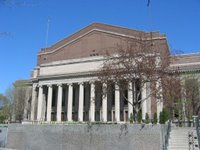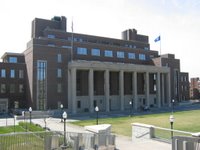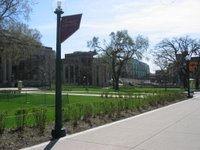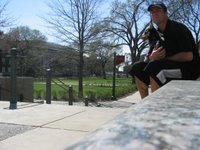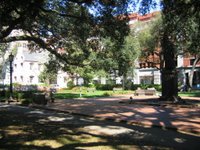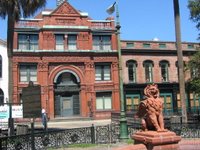Malcolm Gladwell recently wrote a couple of posts on his
blog regarding Barry Bonds and "
Game Of Shadows," a book that recounts the history of BALCO, and Bonds' involvement with it.
More generally, Gladwell discusses how sports should react to the deleterious effect of performance-enhancing drugs on the record keeping & seeking aspect of the games. Basically, how should Bonds and his records (single-season and possible all-time Home Run leader) be treated, and beyond that how can we retroactively determine which records should be taken seriously and which should be discounted as drug-induced.
His solution is to employ a variation on forensic economics, examining the relevant numbers within a standard historical context to make determinations about what is to be expected and what is so completely an outlier that it can't be considered to be untainted in some way.
Forensic economics look at large data sets and draw surprisingly sophisticated inferences about behavior and intention. I think we should loose the forensic economists on all record-setters, and require that athletes pass a statistical plausibility test in the wake of their achievements.
Bonds is his most obvious and relevant example, but he discusses FloJo in some detail as well. Both had late career great leaps forward that have and continue to set off all kinds of alarm bells.
Florence Griffiths Joyner, in 1988. Before that year, her best times in the hundred meters and the two hundred meters were, respectively, 10.96 and 21.96. In 1988, at the advanced (for a sprinter) age of 28, a suddenly huskier FloJo ran 10.49 and 21.34, times that no runner since has even come close to equaling. ... any statistical analysis of the career marks of world class sprinters would have told us that marginally world-class 28 year-olds do not, in the absence of some kind of help, suddenly turn into the greatest runners the world has ever seen.
...
Bonds had the second, ninth and tenth greatest offensive seasons in baseball history at the ages of 36, 37, and 39 respectively—and the average age of everyone else on that list (Gehrig, Foxx, Ruth and Hornsby) is 27. No one—no one—turns himself into one of the greatest hitters of all time in his late 30’s. His home run record should have been denied as statistically implausible.
My reaction is that Gladwell's idea is interesting, but hardly necessary. Look, we know Bonds is using, or at least was using, just as we know that Mark McGwire was using back in the late '90s. Hell, you don't even have to look at their records (although that is certainly sufficient to know), you just had to
look at them and, you know, pay attention.
The question is, what are you going to do about it? Forensic economics can confirm, at least to the degree that statistical probability can confirm anything, that someone was using, but does that really offer
proof?
In the end, you're left with two things. The first is context. For me, two of the most remarkable records in sports are Wilt Chamberlain's 1961-62 scoring average of 50.4 points per game, and Pete Maravich's career college scoring average of 44.2. Both are remarkable for the same reason, an outrageously high level of accomplishment over an extended period of time (80 games for Chamberlain, 83 for Maravich). To put it another way, consider a situation where each scored 30 in a particular game. Put up 30 and you've had a decent game in either college or the NBA. Trouble is, to get back to their averages the next night, Maravich would need to hit for 58 -- Chamberlain for 70!
In short, these are ridiculous numbers.
But, once you start putting them into some context, not so ridiculous. Leaving aside the fact of Chamberlain being an athletic anomaly, consider that his team scored 125 points a game that year, and that half the league averaged 120+ ppg. Last year in the NBA only 20% of the teams in the league managed to average 100 ppg. The Phoenix Suns were considered run 'n' gun freaks for averaging 110. Likewise, Maravich's record becomes a little less bizarre when you consider that during the same 3 years that Maravich was playing Calvin Murphy and Dan Issel were also setting scoring records that still stand.
In both cases, the context is that the game was different. A lot less defense, basically. So you can decide for yourself how amazing the records are, considering the context. For myself, they're both still pretty freakin' amazing.
The same goes for McGwire and Bonds. So Bonds may well eventually hold both significant home run records. How much creedence to I give that, given the context of clear evidence of steroid use by Bonds and many others? Not much.
Which leads to the second possible reaction. Ignore it.
Records like this really aren't (or shouldn't be) the point of the exercise. Sports are interesting to me for a lot of reasons, but records aren't one of them. Bill James put it best back in the day, when he said he wouldn't bother crossing the street to see Pete Rose break Ty Cobb's all-time hit record. The hit itself meant nothing. A meaningless single in a meaningless game -- made all the more meaningless by the fact that the only mananger in the National League at that time that would pencil in Pete Rose's name as his starting first basemen was Pete Rose himself.
So in the end I guess that the question of whether or not Barry Bonds was using as he set his records is pretty much moot for me. Do I believe he was using? Absolutely. Do I care? Not so much.
 It would appear that the University of Illinois' administration and trustees have finally and with finality received the deus ex machina that allows them to blame someone else for pulling the rug out from under Chief Illiniwek.
It would appear that the University of Illinois' administration and trustees have finally and with finality received the deus ex machina that allows them to blame someone else for pulling the rug out from under Chief Illiniwek.






